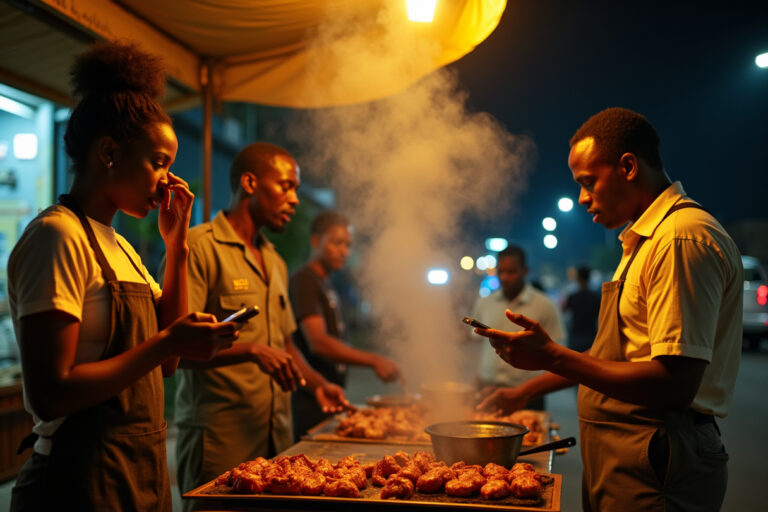The girl at the roadside suya joint sneezed.
“Bless you,” said the man beside her, eyes still glued to his phone.
“You no see the video?” she asked, voice low and suspicious. “Dem say sneezing is the new sign of that disease from China. But na the mutated version.”
He looked up, half-interested.
“Wait… which version? I thought the last one turned people red.”
“No o. This one dey start with sneeze and small headache. My aunty forwarded the video from Facebook. Dem even interview one doctor. He talk the thing live on TikTok.”
Silence. Sizzle. The suya man turned the meat.
From across the stall, a student in NYSC khaki trousers chimed in.
“That doctor no real,” he said. “Him mouth no match the voice. Even the hospital wall na green screen. And the TikTok handle na @truthstation_real_2backup.”
The girl blinked.
“So… it’s fake?”
He nodded.
“Fake like Lagos rent receipts.”
The man with the phone chuckled. “But it was convincing sha. I even almost forwarded it to my boss.”
“And so it begins,” the student replied. “Another day in the kingdom of the internet. Lies just dey do press conference.”
Welcome to the platform palace, population: billions.
At the gates stand the gatekeepers, Algorithms. They do not speak. They only show. Whatever you clicked yesterday becomes your prophecy today. Curiosity becomes conviction. Conviction becomes confusion, dressed in confidence.
Inside, the rooms are many. Each one lit like a nightclub. Headlines flash. Videos loop. Voice notes echo. The walls pulse with outrage. The carpet is woven from recycled hashtags. The music? Notifications on repeat.
This isn’t just a place where people talk.
It’s where information breathes.
Where facts and fiction share bunk beds.
Where drama earns rewards and truth struggles to pay rent.
On Platform Street, everyone has a role:
- Facebook is the uncle who means well but shares everything. Everything.
- WhatsApp is your grandmother’s prayer chain turned panic headquarters.
- Twitter is where logic and sarcasm fight every morning at 7 a.m.
- YouTube is the basement where conspiracy theories grow beards.
- And TikTok is the carnival where misinformation dances in costume and goes viral in 15 seconds.
Everything spreads fast here. Except accountability.
Let’s be clear. The platforms were not built to deceive. They were built to connect, inform and entertain.
But somewhere between the Like button and the sponsored content, something shifted.
They started rewarding what performs, not what is true. What is emotional, not what is ethical. What is viral, not what is verified.
And false information?
It performs.
It sings. It cries. It accuses. It comforts. It flatters your fears and dances to your doubts. It does not need to be well-made. It just needs to feel real.
Meanwhile, truth sits quietly.
No filters. No sound effects.
It wears glasses and carries a footnote.
It waits patiently while the lie gathers likes.
And that is the problem.
In a world where platforms reward speed and spectacle, truth rarely trends.
So, what can we do?
You, the user, the citizen, the midnight scroller, yes, you, still have power.
You can pause.
You can question.
You can ask, “Where is this from?” before you ask, “Did you hear?”
You can be the friction in a system that loves frictionless flow.
Because platforms are not just websites. They are rooms we live in. And like any home, they reflect our choices.
If lies are thriving, it’s not only because they are loud.
It is because the palace doors are wide open, the spotlight is generous, and the audience rarely asks for proof.
But if enough people turn to the truth and say, “Speak louder,”
maybe the walls will shift.
Maybe the palace will remember why it was built.
And maybe, just maybe, sneezing at a suya joint won’t lead to viral panic again.





